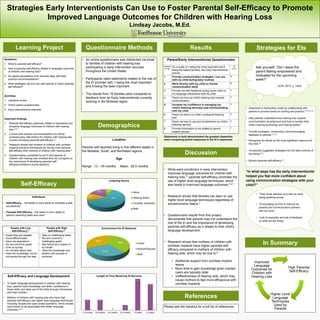
Jacobs EHDI Poster Final
- 1. Learning Project Self-Efficacy Questionnaire Methods Results Discussion In Summary Demographics Questions 1. What is parental self-efficacy? 2. How is parental self-efficacy related to language outcomes of children with hearing loss? 3. Do parent perceptions of EI services align with best practice recommendations? 4. What strategies can EIs use with parents to foster parental self-efficacy? Activities 1. Literature review 2. Online parent questionnaire 3. Early Interventionist interview Important findings 1. Parental self-efficacy positively relates to expressive and receptive language outcomes of children with hearing loss.3,5,7 2. Current best practice recommendations for family- centered early intervention for children with hearing loss include increasing parental self-efficacy.12 3. Research shows that mothers of children with cochlear implants perceive themselves as having more parental self-efficacy than mothers of children with hearing aids.6 4. Questionnaires completed by an EI and parents of children with hearing loss revealed they did not agree on the importance of developing parental self- efficacy/confidence during sessions. • Implement a mentorship model by collaborating with parents to provide hands-on training and practice.4,7,8,10,13 • Help parents understand how hearing loss impacts communication development and how to monitor their child’s hearing technology and hearing status.2 • Provide consistent, constructive, and encouraging feedback to parents.2,7,13 • Recognize the family as the most significant resource for the child.10 • Incorporate suggested strategies into the daily routines of the family.8,13 • Monitor parental self-efficacy.4,7 Parent/Early Interventionist Questionnaire Parents (n=16) On a scale of 1 being the most important and 8 being the least important, the Early Interventionist should… EI (n=1) 1 Provide communication strategies I can use with my child during daily routines 4 2 Work directly with my child on his/her communication skills 8 3 Provide me with feedback during home visits on my language interactions with my child 3 4 Teach me how my child’s hearing loss impacts communication 2 5 Increase my confidence in managing my child’s listening device(s) and communicating with my child 1 6 Teach me about my child’s audiogram/hearing loss 5 7 Teach me how to use and troubleshoot my child’s listening devices 6 8 Provide information to me related to parent support groups 7 6% 62%13% 19% Listening Device None Hearing Aid(s) Cochlear Implant(s) Both 38% 31% 31% Environment for EI Sessions Home School/Daycare Both • An online questionnaire was distributed via email to families of children with hearing loss participating in early intervention services throughout the United States. • Participants rated statements related to the role of the EI provider with 1 being the most important and 8 being the least important. • The results from 16 families were compared to feedback from an Early Interventionist currently working in the Midwest region. Location Parents self-reported living in five different states in the Midwest, South, and Northeast regions. Age Range: 13 – 45 months Mean: 26.5 months 2 2 0 1 6 5 0-3 months 3-6 months 6-9 months 9-12 months 1-2 years 2-3 years Length of Time Receiving EI Services High Parental Self-Efficacy Higher Level Language Techniques Used by Parents Improved Language Outcomes for Children with Hearing Loss People with Low Self-Efficacy1,7 People with High Self-Efficacy1,7 • Doubt they are capable • Avoid difficult tasks • Have low aspirations • Do not commit to goals • Give up quickly • Do not take failure well • Have the knowledge, but do not persist through the task • Take on challenging tasks • Set and commit to challenging goals • See failure as a reason to try harder • Have the knowledge and persist until success is achieved Definitions • Self-Efficacy - the belief in one’s ability to complete a task successfully1 • Parental Self-Efficacy – the belief in one’s ability to perform parenting tasks and roles7 • “They never allowed us to feel we were doing anything wrong.” • “Encouraging us how to improve as parents and communication partners with our child.” • “Lots of examples and lots of feedback on what we are doing.” Ask yourself, “Did I leave the parent feeling empowered and motivated for the upcoming week?” (JCIH, 2013, p. 1345) Strategies Early Interventionists Can Use to Foster Parental Self-Efficacy to Promote Improved Language Outcomes for Children with Hearing Loss Lindsay Jacobs, M.Ed. “In what ways has the early interventionist helped you feel more confident about using communication strategies with your child?” Statements in bold demonstrated the greatest disparities when comparing parent responses to the EI’s responses. • While early enrollment in early intervention improves language outcomes for children with hearing loss,11 parental self-efficacy promotes the use of higher level language techniques, which also leads to improved language outcomes.3,5,7 • Research shows that families can learn to use higher level language techniques regardless of socioeconomic status.3 • Questionnaire results from this project demonstrate that parents may not understand the role of the EI and the importance of developing parental self-efficacy as it relates to their child’s language development. • Research shows that mothers of children with cochlear implants have higher parental self- efficacy compared to mothers of children with hearing aids, which may be due to:6 • Additional support from cochlear implant teams • More time to gain knowledge given implant users are typically older • Ineffectiveness of hearing aids, which may cause mothers to feel more efficacious with cochlear implants Self-Efficacy and Language Development • To foster language development in children with hearing loss, parents need knowledge and skills, confidence in those skills, and daily use of the skills through interactions with their children.7 • Mothers of children with hearing loss who have high parental self-efficacy use higher level language techniques including recasts and open-ended questions, which studies have shown to be associated with better language outcomes.3,5,7 References Strategies for EIs Please see the handout for a full list of references.